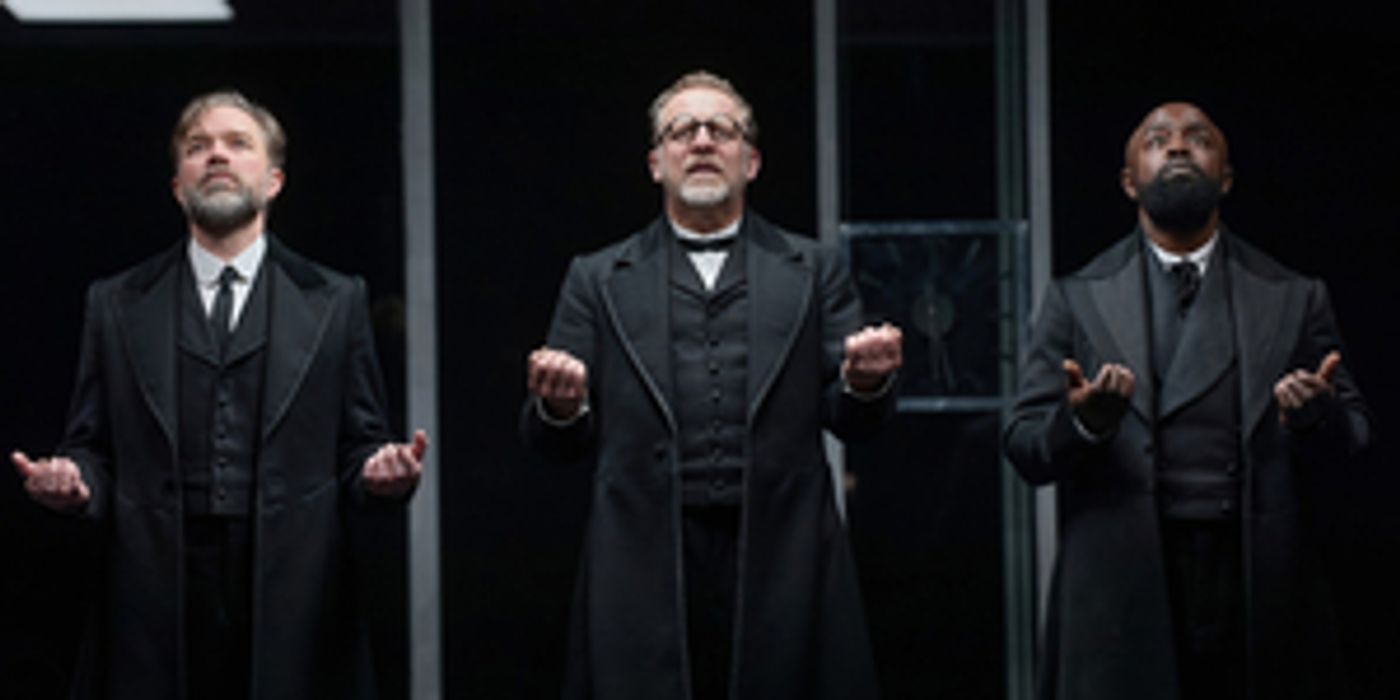Review: THE LEHMAN TRILOGY, Gillian Lynne Theatre
Dizzyingly deft acting and expert direction make every minute count

![]() Sam Mendes' The Lehman Trilogy has criss-crossed the Atlantic since 2008, picking up numerous nominations and awards along the way. An epic history of Western capitalism and a masterclass in theatrical storytelling, it now makes a dazzling return to the West End's Gillian Lynne Theatre.
Sam Mendes' The Lehman Trilogy has criss-crossed the Atlantic since 2008, picking up numerous nominations and awards along the way. An epic history of Western capitalism and a masterclass in theatrical storytelling, it now makes a dazzling return to the West End's Gillian Lynne Theatre.
In September 2008, Lehman Brothers collapsed and sparked the greatest financial devastation since the Great Depression. Adapted from Stefano Massini's play, Ben Power and director Sam Mendes tell the story of the men behind the world-famous corporation.
The scale and scope of the play is huge: three brothers from Rimpar, Bavaria - Henry, Emanuel and Mayer Lehman- come to America in the 1840s and 50s. They move from setting up a modest one-room cloth shop in Alabama, to money-lending middlemen, to controlling the fate of Western capitalism itself.
Each generation overtakes the last, with shifting accents, attitudes and the ever-changing sign of the Lehman Brothers shop, each one marked in pen on the glass walls of the set. Time becomes more fleeting; Jewish religious practices are no longer deemed important; sitting Shiva for a week, becomes three days, becomes just three minutes as the original brothers die in turn.
The sheer scale and demands of the production are a big ask for the trio of actors. Fortunately, they all demonstrate wonderfully harmonied and fluid performances.
Hadley Fraser is the standout as patronised Mayer Lehman. He shows astounding adaptability; flitting between a hilarious procession of Philip's potential wives to dancing himself to death as the delusional Bobbie, literally high on capitalism, while the stock market speeds towards destruction around him.
Michael Balogun does not have quite such mastery over rapidly jumping between accents, but shows deep, authoritative calm as Emanuel Lehman and has a striking stage presence throughout.
Nigel Lindsay has the masterful Simon Russell Beale's shoes to fill as Henry Lehman, but shows aptitude for every character; from a daring tightrope-walker, to a decrepit, didactic rabbi and a flirty divorcee.
Sam Mendes' direction remains expertly plotted and purposeful; nothing is wasted and embraces Power's expertly paced script. At nearly three and half hours, this is a long play, but the constantly changing rhythm makes every moment count.
The dialogue is set to the perceptive soundtrack of Nick Powell's beautiful piano. Often giving the impression of a non-stop carousel, it is played with wonderful energy by pianist, Yshani Perinpanayagam.
Es Devlin's set looks great on the Gillian Lynne stage; an impressive, revolving, giant glass box split into meeting rooms of a corporate office. Behind it, a huge screen curving the width of the stage projects Luke Halls' impressive and subtly changing backdrops from the plantations of Alabama to the evolving skyline of New York.
Props consist mainly of cardboard storage boxes, which are a powerful visual symbol for the financial collapse. They become podiums, towers of Babel, the columns of the New York Stock Exchange. It's deceptively clever in its simplicity.
Those expecting an exploration into the bank's role in the financial crisis will be disappointed; despite beginning and ending the show, we never get into the mechanics of the causes and the final crash does feel a little rushed. However, this is not really what the play is about. It's about family ties, overarching ambition and a cautionary tale about the so-called American dream.
The Lehman Trilogy is at the Gillian Lynne Theatre until 20 May
Photo Credit: Mark Douet
Reader Reviews
Powered by
|
Videos

